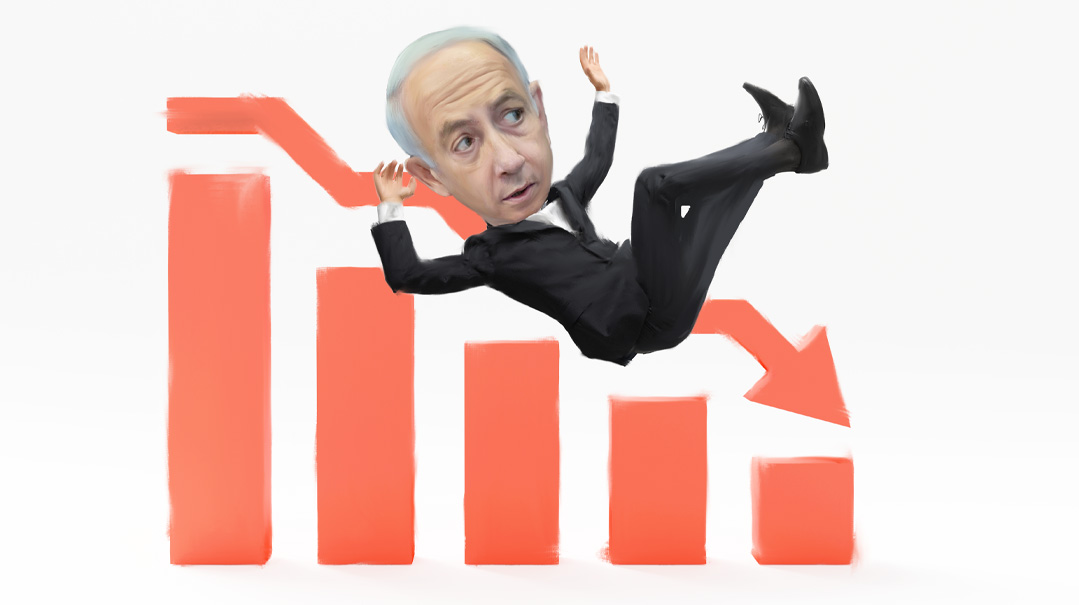Bibi vs. The Markets

As Bibi pushes legal reforms, the Left pulls economic levers

1
“Ten measures of beauty descended to the world, and nine were taken by Jerusalem,” Chazal teach us; but none of the city’s nine measures appear to have gone to the prime minister’s office at 3 Kaplan Street, a generic brick edifice lacking any grace or individuality. Aside from the airtight security, it bears little resemblance to other seats of power such as the White House, the Elysée Palace, or even the relatively somber No. 10 Downing Street.
Never judge a book by its cover. From the interior, the building could easily be taken for the nerve center of a world power. There’s never a dull moment, and hardly a day goes by without an existential crisis necessitating an urgent meeting in one of the building’s conference rooms. But one room, the one used for press conferences, is reserved for times of national emergency. During wars or other crises (e.g., the coronavirus), the prime minister arrives at 8 p.m. — prime time TV hour — to address the Israeli public.
This time, it was neither about the operation in Jenin nor about the resurgent coronavirus. The first press conference of Netanyahu’s sixth term was focused on economics, but could easily have been mistaken for a wartime address. And to pursue the military metaphor, the sense in the room was that Netanyahu had walked into an ambush. Two days earlier, Netanyahu seemed more than usually cocky when I saw him at the Knesset’s Jerusalem Hall, where coalition leaders had gathered in a show of support for Shas chairman Aryeh Deri after his dismissal from the cabinet by order of the High Court.
The Shas activists packing the hall, never circumspect in their language, sounded tame compared to the coalition leaders. Rhetoric previously used only by militant Justice Minister Yariv Levin became general fare at the event. In his remarks, Netanyahu — followed by the rest of the coalition leaders — aimed his guns directly at the High Court justices, calling them arrogant and aloof and warning that their ruling against Deri would return on them like a boomerang.
The rhetoric in the Knesset last week gained extra significance in light of the fact that it came after two straight weeks of Motzaei Shabbos mass rallies in Tel Aviv against the judicial revolution. Bibi didn’t blink in the face of the protest movement, covering his justice minister’s back in an impressive show of support.
2
Just two days after the public show of support, the confident feeling in the prime minister’s circle had evaporated, giving way to profound concern. The aptest antecedent for the mood in the press conference room might be the panicked atmosphere that reigned in No. 10 Downing Street throughout Liz Truss’s fleeting government.
Where tens of thousands of protesters, calls for civil disobedience from leftist politicians, the High Court president’s sensational speech, and signed letters from leading jurists, all failed, warnings from senior economists succeeded.
The Israeli left has pinpointed the Achilles heel of Netanyahu’s sixth government: the economy. One after another, Israel’s leading economists (all aligned with the left), as well as high-tech CEOs living in the “state of Tel Aviv,” came out with judgment day economic predictions, explaining to anyone who would listen that Levin’s judicial revolution will scare away international investors, as happened in Hungary and Poland (whose credit ratings declined after hard-right governments curbed the judiciary).
If there’s anyone in Israeli politics who understands economics, it’s Binyamin Netanyahu. Bibi sees himself as having ushered Israel into an economic golden age, and there’s no denying that the data supports that thesis. Under his stewardship, the Israeli economy has flourished, despite a number of worldwide crises.
When the fear-mongering over an “economic tsunami” began, Bibi responded with derision, much as he did to former prime minister Ehud Barak’s warnings of a “diplomatic tsunami.” The Abraham Accords made that warning sound like a parody.
Only this time, Netanyahu soon had to wipe the smile from his face. Even normally supportive economists such as Eugene Kandel went on the offensive, and the hammer blow came when Bank of Israel governor Amir Yaron, appointed by Bibi himself in 2018, returned from Davos with a warning that his government’s judicial policies could decrease Israel’s international credit rating.
The protesters in the streets compared Israel to Hungary and Poland, but when the penny dropped, Netanyahu was thinking of the Truss ministry, spectacularly brought down by credit rating agencies less than two months into its tenure.
3
The people Netanyahu chose to flank him at the press conference testify to the severity of the crisis. Present by virtue of his position was finance minister Bezalel Smotrich, who strong-armed Netanyahu into giving him the role through coalition negotiations.
But more telling by far were the two Likud ministers Bibi chose to bring along to the press conference. The first was Foreign Minister Eli Cohen. While Bibi favors Ron Dermer for foreign affairs — bringing him along to his visit with King Abdullah of Jordan last week — he wanted his foreign minister at the economic press conference for his impressive fiscal record as an accountant at the international BDO firm and a leading representative of the Israeli branch of S&P, one of the “Big Three” rating agencies.
The second Likud minister Bibi brought along was Nir Barkat, former Jerusalem mayor and current economy minister. Barkat boasts an impressive economic résumé as one of Israel’s high-tech pioneers who pulled off an impressive exit in the ’90s and whose wealth is currently estimated at NIS 1.3 billion by Forbes.
Netanyahu brought the two Likud ministers along to send a message that government policy is not being steered by right-wing fanatics, but by responsible figures who know a thing or two about economics.
In his remarks, Bibi went on the offensive, pinning the excess regulations and bureaucracy that international investors in Israel have to deal with on the High Court; he blamed this “judicialization” — as he put it — for the fact that business dispute lawsuits take twice as long to settle in Israel as in the rest of the West. The finance minister for his part singled out Aharon Barak’s judicial revolution for giving the opinion of justices higher priority than that of the parties to a contract.
But Netanyahu’s arguments have only encouraged the left, which has identified his weak point and now appears to be praying for an economic crisis to rein him in on the judicial front.
There are few things Netanyahu enjoys more than demonstrating his knowledge of economics. This time, however, it seems the left is giving him a lesson.
(Originally featured in Mishpacha, Issue 947)
Oops! We could not locate your form.







